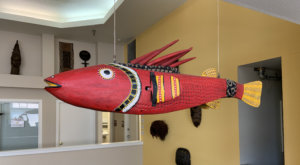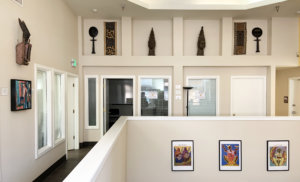This content block does not have a preview.
“You guys are me; I am you.”
— Lanetta Garner
CCC’s Imani Center is not like other recovery programs. Imani provides mental health and substance use disorder treatment specifically for African-Americans, by African-Americans — and the center exudes feelings of community, connection and healing from the moment clients step through the doors.
As the first person who clients and visitors see when they walk into the building, Administrative Specialist Lanetta Garner plays an important role in creating the welcoming environment that Imani Center is known for. Lanetta creates strong bonds with clients and loves to watch their journeys, from the moment they start on their recovery path and every step along the way.

Art fills the walls at the Imani Center, bringing historical and cultural healing to the space – and to the people in it.
When the COVID-19 pandemic began to unfold, the community at Imani Center faced disruption. With group gatherings and face-to-face meetings posing a public health risk, the Imani team worked swiftly to respond to the challenge. They established new practices for maintaining connection to clients over the phone. They quickly recognized a barrier, however: some clients did not have access to cell phones and wouldn’t be able to participate in remote care without them.
So the team, led by Program Director Linda Hudson, reached out for support. CareOregon — a nonprofit company that manages benefits and coordinates care for Oregon Health Plan and Medicare members —stepped up to provide cell phones for clients who lacked them. Lanetta made sure that every single person who needed a phone, got one — and that they knew how to use it.
This kind of initiative is par for the course at Imani, where the program centers around being responsive to its community’s needs. The staff, who all have lived knowledge of Black culture and the African American experience, tailor their work to fit the realities of their clients’ day-to-day lives.
For Lanetta, that responsiveness shows up in the way she interacts with clients, whether on the phone or face-to-face. She sets a tone of caring and empathy right from the start, drawing on her own life experiences. Lanetta often reassures clients by saying, “You guys are me; I am you.”

Group support sessions and community-building play an important role in Imani’s approach to recovery. The group rooms sit empty these days, due to public health restrictions – but staff will begin video-based group sessions soon, using cell phones that they recently distributed to clients.
These days, Lanetta is often the only staff person on site at Imani. Other team members — including alcohol and drug counselors, mental health counselors, dually credentialed addiction and mental health professionals and peer support specialists — are working remotely, connecting with clients and each other via those new phones. Lanetta has become the glue for them all, keeping things together in the formerly bustling space until everyone can return.
“I love my job,” she said. “I show up for it.”
But the building feels empty to Lanetta without the rest of the “family” — that is, her coworkers and Imani clients. She misses them. For now, clients often knock on the window and wave to her as they go by. They exchange greetings through the glass and check on each other.
Lanetta, a true CCC Champion, is looking forward to the day when they will all be walking through the front door again.